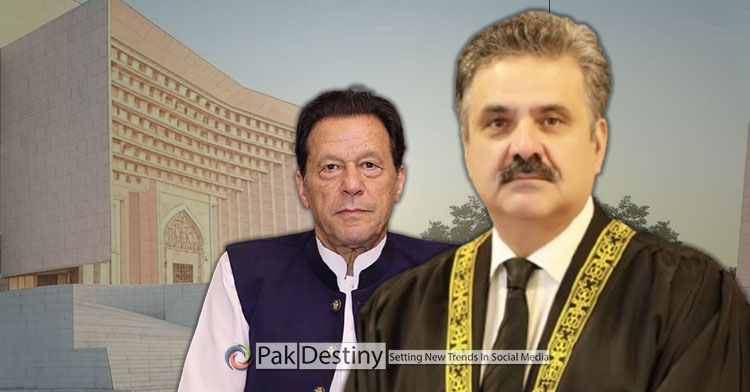
By Irum Saleem
The Supreme Court has issued an official statement detailing a meeting between Chief Justice of Pakistan Yahya Afridi and a delegation from Pakistan Tehreek-e-Insaf (PTI). The meeting, which lasted for two hours, provided an opportunity for the PTI leaders to voice their concerns regarding legal and political matters, particularly those affecting their party and the broader judicial landscape.
Chief Justice’s Initiative for Judicial Reforms
According to the Supreme Court’s statement, Chief Justice Afridi invited opposition leaders for consultations on judicial reforms. The discussions aimed to include a broad range of stakeholders to ensure a more inclusive and effective approach to legal and judicial improvements.
During the meeting, the Chief Justice informed the PTI delegation that he had recently met with Prime Minister Shehbaz Sharif. He had requested the government’s perspective on the judicial reform agenda, and in response, the Prime Minister welcomed the initiative and assured his full support in both policy-making and implementation.
Judiciary’s Priorities and National Concerns
Chief Justice Afridi briefed the PTI delegation on the ongoing efforts to gather input from relevant legal bodies, including bar councils across Pakistan, public opinion, and district judiciary representatives. He mentioned that feedback from high court registrars and provincial judicial academies was also expected soon.
One of the key issues raised during his discussion was the backlog of pending tax-related cases. The Chief Justice noted that the Prime Minister had expressed serious concerns about the delays in resolving tax disputes across different judicial forums. In response, he assured the Prime Minister that expediting tax cases and reducing the overall backlog of pending cases would be a top priority for the judiciary.
PTI Delegation’s Key Demands and Observations
The PTI delegation, which included prominent leaders such as Omar Ayub, Shibli Faraz, Barrister Gohar Ali Khan, Barrister Ali Zafar, Barrister Salman Akram Raja, Latif Khosa, and Dr. Babar Awan, raised several issues during the meeting. Supreme Court Registrar Muhammad Saleem Khan and Law and Justice Commission Secretary Tanzila Sabahat were also present to assist the Chief Justice.
Judicial Reforms as a National Agenda: Chief Justice Afridi suggested that judicial reforms should be established as a “minimum common national agenda” and emphasized the need for bipartisan cooperation to ensure meaningful legal improvements.
Economic Stability Linked to Rule of Law: PTI leader Omar Ayub highlighted that Pakistan’s economic stability is directly linked to the rule of law. He argued that judicial accountability is essential to restoring investor confidence and ensuring economic recovery. He further stated that the judiciary must play a stronger role in holding the executive branch accountable.
PTI’s Acknowledgment of Judicial Reform Needs: Other PTI leaders in attendance echoed similar views, acknowledging that reforms in the judicial system were necessary to improve transparency, efficiency, and access to justice.
Request for Additional Time for Policy Review: During the meeting, Barrister Ali Zafar requested more time to review and respond to the judicial reform proposals put forward by the Supreme Court. He also emphasized the importance of reforming the criminal justice system and expediting the resolution of civil cases, which have historically suffered from prolonged delays.
Conclusion
The two-hour-long meeting between the PTI delegation and Chief Justice Afridi reflected both sides’ willingness to engage in constructive dialogue on judicial reforms. While the Chief Justice outlined his vision for improving the judiciary and reducing case backlogs, the PTI leadership stressed the importance of judicial independence, accountability, and the rule of law in stabilizing the country’s political and economic environment.
This engagement marks an important step in Pakistan’s ongoing judicial reform process and highlights the judiciary’s role in facilitating national dialogue between political stakeholders. However, the effectiveness of these discussions will depend on whether concrete steps are taken to address the concerns raised and implement meaningful judicial reforms in the near future.






